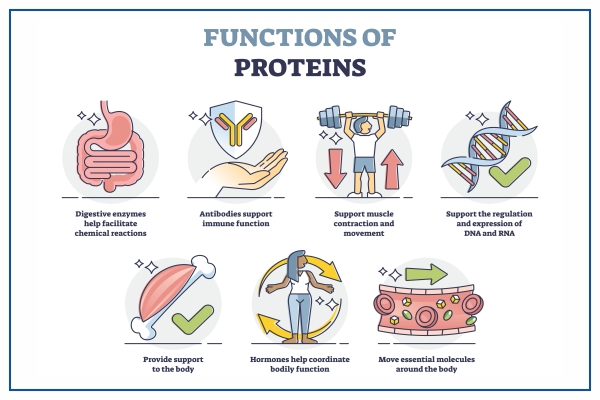The Benefits of Proteins
In this article, we will explore the numerous benefits of proteins and how they contribute to overall health and well-being.
Proteins: The Building Blocks of Life
Proteins are essential macronutrients that play a vital role in the structure, function, and regulation of the body’s tissues and organs. They are often referred to as the building blocks of life, and for good reason. Proteins are composed of amino acids, which are linked together in a specific sequence to form long chains.
These chains fold into unique three-dimensional structures, enabling proteins to perform a wide range of functions within the body. From building and repairing tissues to facilitating chemical reactions and transporting molecules, proteins are involved in virtually every biological process.
The Importance of Protein in a Healthy Diet
Protein is an essential nutrient that our bodies require in adequate amounts to function optimally. Including protein-rich foods in our diet is crucial for several reasons:
Muscle Growth and Repair:
Protein is crucial for building and repairing muscles. It provides the necessary amino acids that aid in muscle synthesis and recovery, making it particularly important for athletes and individuals engaging in regular physical activity.
Satiety and Weight Management:
Protein has a high satiety value, meaning it keeps you feeling full and satisfied for longer periods. Including protein in your meals can help curb cravings and reduce overall calorie intake, supporting healthy weight management.
Metabolism and Energy:
Proteins play a significant role in metabolic processes. They are involved in the production of enzymes and hormones, which regulate various bodily functions and contribute to energy production.
Immune Function:
Many components of the immune system, such as antibodies, are made up of proteins. Adequate protein intake supports a healthy immune system, helping to defend against infections and illnesses.
Protein-Rich Foods to Include in Your Diet
To ensure you meet your protein needs, it is essential to include a variety of protein-rich foods in your diet. Some excellent sources of protein include:
Lean meats such as chicken, turkey, and lean cuts of beef
Fish and seafood
Eggs
Dairy products such as milk, yogurt, and cheese
Legumes, including beans, lentils, and chickpeas
Nuts and seeds
Soy products such as tofu and tempeh
By incorporating these protein-rich foods into your meals and snacks, you can ensure you are getting an adequate and diverse range of amino acids to support your overall health.

Proteins are an essential component of a healthy diet and play a crucial role in various bodily functions. From muscle growth and repair to immune function and metabolism, proteins are involved in numerous processes that contribute to overall well-being.
By including a variety of protein-rich foods in your diet, you can ensure you are meeting your protein needs and reaping the benefits of this vital macronutrient.
Frequently Asked Questions about the Benefits of Proteins
1. What are proteins?
Proteins are large molecules made up of amino acids that are essential for the structure, function, and regulation of the body’s tissues and organs.
2. Why are proteins important for our body?
Proteins play a crucial role in building and repairing tissues, supporting the immune system, producing enzymes and hormones, and providing energy.
3. How do proteins help in muscle building?
Proteins are the building blocks of muscles. Consuming adequate protein helps in repairing and rebuilding muscle tissues after exercise, promoting muscle growth and strength.
4. Can proteins help with weight loss?
Proteins can aid in weight loss as they have a higher thermic effect, meaning they require more energy to digest, thus increasing calorie burning. They also promote satiety, reducing appetite and cravings.
5. Are proteins beneficial for hair and nail health?
Yes, proteins are important for maintaining healthy hair and nails. They provide the necessary nutrients for hair and nail growth, strength, and repair.
6. Do proteins help in maintaining a healthy immune system?
Proteins are essential for a well-functioning immune system. They help produce antibodies, enzymes, and other molecules that fight off infections and support immune cells.
7. Can proteins improve bone health?
Proteins contribute to maintaining strong and healthy bones. They aid in calcium absorption and help in the production of collagen, a protein that provides structure to bones.
8. Are proteins beneficial for brain function?
Yes, proteins play a vital role in brain function. They are involved in the production of neurotransmitters, which are essential for communication between brain cells and overall cognitive function.
9. Can proteins help with reducing muscle soreness?
Consuming proteins after intense exercise can assist in reducing muscle soreness and promoting faster recovery by providing the necessary amino acids for muscle repair.
10. Are proteins important for overall growth and development?
Absolutely! Proteins are crucial for growth and development in children, as they are necessary for the formation of new tissues, such as muscles, bones, and organs.




